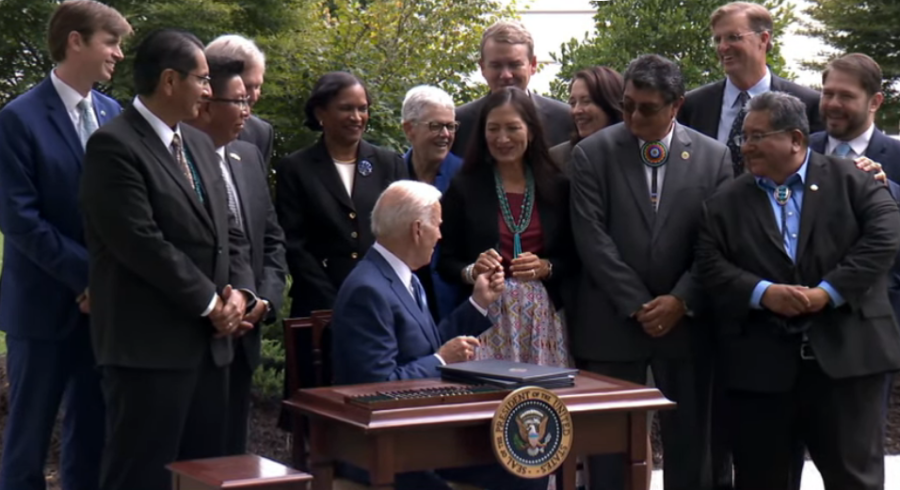Understanding National Native American Heritage Month
Diving into why we celebrate Native Americans during November
Photo courtesy of nativenewsonline.net (via the White House)
President Biden signs the Declaration on October 29
November 16, 2021
With the proclamation declaring November as National Native American Heritage Month by President Joe Biden on October 28, 2021, we formally celebrate Indigenous people across the country by educating ourselves on the struggles they continue to overcome as they remain a key contributing community to our society.
The information provided in history classes scratches the surface of the lives of Native Americans in our country, which demonstrates the necessity to learn about their community and why we dedicate November to their heritage.
“During National Native American Heritage Month, we celebrate the countless contributions of Native peoples past and present, honor the influence they have had on the advancement of our Nation, and recommit ourselves to upholding trust and treaty responsibilities, strengthening Tribal sovereignty, and advancing Tribal self-determination,” Biden said in the briefing room on October 29.
When referring to Native Americans, it is important to understand their experiences in our country prior to Christopher Columbus’ arrival in 1492 as an introduction to European colonization. Their diverse populations and prosperous communities need to be recognized and commended as building blocks of modern-day society.
“There is no aspect of American history that has not been impacted by our tribal communities, which predate the state’s and nation’s founding by centuries,” Governor of the Gila River Tribal Stephen Roe Lewis said. “From military service to agriculture to the conservation of water and land, our tribes have always played a hugely significant role in shaping the world around us. Our heritage speaks to our defining ability to meet every challenge, to transcend even the most difficult circumstances, and to contribute to the fabric of this country.”
The struggles of the Native American community do not go unnoticed. From the effects of colonization to the rising issue of poverty and unemployment to now climate change and environmental racism, acknowledging their experiences is imperative, especially during November.
“In the U.S., one in three Native Americans are living in poverty, with the average individual earning a median income of just $23,000 a year,” According to DiversityInc. “COVID-19 has only made that figure worse with thousands of additional jobs being lost over the course of 2020, especially among Indigenous women.”
Despite the ongoing struggles of the Native American population, they continue to prevail and demonstrate their resilience despite the negative impact of society on their community, an admirable ability deserving of recognition.
“This month and every month, we honor the precious, strong, and enduring cultures and contributions of all Native Americans and recommit ourselves to fulfilling the full promise of our Nation together,” Biden said.






